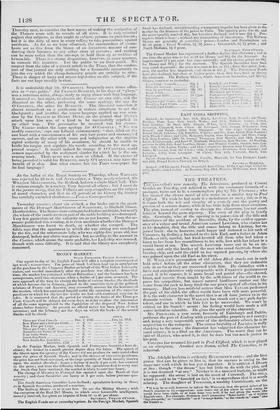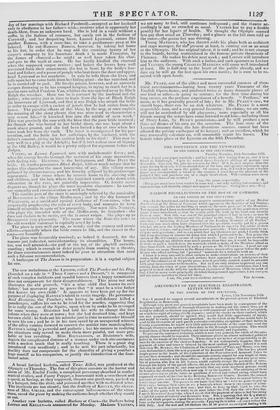The Adelphi burletta is evidently BreasTose's entire ; and the
best praise that can he given to him is, that its success is owing to the stage-tact with which he has put it together. It is entitled A Dream at Sea ; though " the dream " has but little to do with the plot, and it is not dreamed "at sea." Neither is it a nautical burletta, as might be supposed : the scene is laid on the coast of Cornwall. The stood., which is said to be "founded on fact," is so marvellous that it is worth relating. The daughter of Trevanion, a wealthy Cornishman, on the • it may be as well, however, to inform Mr. WALLACR, tIldi the grand dert....t of his Ecotelt consists in its exaggeration: nine times out of ten where he went wrong, tie wood have been right, or at least done very well. if he had given the wo.rds irks English ones. For example. Scotsmen don't pronounce " fashionable" as la written "fay.shismable," or "remarkable" as if " remayr-kable." or the vowels in room" haw the French a.
aay of her marriage with Richard Penderell—accepted as her husband only in obedience to her father's wish—receives what is apparently her death-blow, from an unknown hand. She is laid in a vault without a coffin, in the fashion of romance, but surely not in the fashion of Cornwall ; and her despairing lover, Launce Lynwood, comes like another Romeo, with a crow-bar, to take a posthumous peep at his
beloved. He out-Romeos Romeo, however, by taking her home to his hut, in order that he may add the crowning luxury of her corpse's company to his luxurious death A hi mode Francaise, by the fumes of charcoal— he might as well have taken his char- coal-pan to the vault at once. He has hardly kindled the charcoal when the supposed corpse revives ; and before the lovers have well recovered from their amazement, the but is beset by the bride's hus- band and father, and a posse of people who beat down the door and appre- hend Lynwood as her murderer. In vain he tells them she lives, and calls upon her to come forth from her hiding-place : she has vanished, and he is carried off to gaol. He breaks prison, however, and as narrowly escapes drowning as he has escaped banging, in trying to reach her in a marine cave culled Pendeen \Tau, whither she was spirited away by Black Ralph the wrecker. Here too he is pursued by the husband and the father ; who arrive just in time to learn from the lips of Black Ralph the innocence of Lynwood, and that it was Ralph who struck the bride in order to escape with a casket of jewels that he had stolen from the house. The peculiar effects of this blow, by the way, at once explain the meaning of the slang phrase that was once used to characterize a very severe hit—" it knocked him into the middle of next week." This was precisely the case with the blow that the poor bride received ; for though she was buried in her bridal dress, she was kept about a week above ground, and she had been buried a day or two when her lover took her from the vault. The lover is recompensed for his per- secution, and the bride for her sufferings, by the husband, with the father's consent, giving up his maiden bride to his rival ! This mar be very well in a play at the Adelphi ; but if it isn't a clear case of bigamy at the Old Bailey, it would be a pretty subject for argument before the Judges. VINING, as Lannec Lynwood, acts with melodramatic force ; and, when his energy breaks through the restraint of his stage mannerism, with feeling too. I IINIMING is the bridegroom, and Miss DALY the bride. 0. Smitit personates Bloch Ralph, with so much nature that he makes this character the most interesting of any. His villany seems palliated by circumstances, and his ferocity eclipsed by his picturesque appearance. The scene where he returns home to his star ring wife and children, and the last, where the famished wretch sinks down with exhaustion in the cave, are painfully impressive. 0. SMITH never disgusts us, though he plays the most repulsive characters he excites our sympathy and commiseration as well as horror. The sombre part of the story is amusingly relieved by the comicality of BUCKSTONE as the village Mullin-rush ; and by the dry humour of MIA:is:sox, as a sordid and cynical Collector of I'oor-rates, who is perpetually prophesying the ruin of every body, and manages to keep himself miserable ill spite of his prosperity. or must Mrs. NiSBETT, who plays the intended wife of the Muffin-man, be forgotten : she does not disdain to be rustic, yet she is never vulgar. She plays up to Buess-rosa: very pleasantly. The scene where she finds the notes in the old cowskin waistcoat is capitally acted by both. The piece is very well got up, as usual; and the scenery and scenic effects—especially where the bride comes to life, and the sunset in the cave—are beautiful.
The piece was favourably received ; as indeed it deserved, for the reasons just indicated, notwithstanding its absurdities. The house, too, was well attended—the puff at the top of the playbill notwith- standing; which is enough to deter people from coming to a theatre, for those entertainments must indeed be poor in attraction that need such a fulsome recommendation.
A burlesque of The Jewess is in preparation : it is a capital subject
for one.



























 Previous page
Previous page